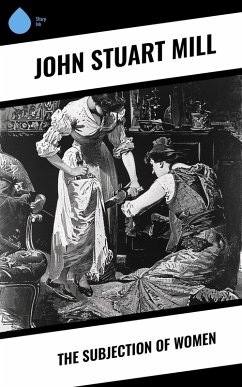
The Subjection of Women (eBook, ePUB)

PAYBACK Punkte
0 °P sammeln!
In "The Subjection of Women," John Stuart Mill presents a compelling argument for gender equality and women's rights, articulating a progressive vision during the Victorian era's restrictive social norms. Employing a persuasive and analytical literary style, Mill blends philosophical reasoning with empirical observations, invoking Enlightenment ideals to challenge the subordination of women. He critiques both legal frameworks and societal mores that perpetuate inequality, positing that the emancipation of women would yield significant social and moral benefits to society as a whole. John Stuar...
In "The Subjection of Women," John Stuart Mill presents a compelling argument for gender equality and women's rights, articulating a progressive vision during the Victorian era's restrictive social norms. Employing a persuasive and analytical literary style, Mill blends philosophical reasoning with empirical observations, invoking Enlightenment ideals to challenge the subordination of women. He critiques both legal frameworks and societal mores that perpetuate inequality, positing that the emancipation of women would yield significant social and moral benefits to society as a whole. John Stuart Mill, a prominent 19th-century philosopher and political economist, was profoundly influenced by his liberal upbringing and the methodologies of utilitarianism. His collaboration with fellow intellectual Harriet Taylor, a staunch advocate for women's rights, intensified his commitment to the cause, motivating him to articulate a systematic case for gender equality. Mill's work emerges not only as a reflection of his personal convictions but also as a response to the broader debates surrounding individual liberties and social justice of his time. "The Subjection of Women" is an essential read for anyone interested in political theory, feminism, or social justice. Mill's nuanced arguments remain relevant today, providing a foundational understanding of gender dynamics and inspiring ongoing discussions about equality. This seminal text deserves a place on the bookshelves of scholars, activists, and any readers seeking to grapple with the complexities of human rights.
Dieser Download kann aus rechtlichen Gründen nur mit Rechnungsadresse in A, B, BG, CY, CZ, D, DK, EW, E, FIN, F, GR, H, IRL, I, LT, L, LR, M, NL, PL, P, R, S, SLO, SK ausgeliefert werden.













